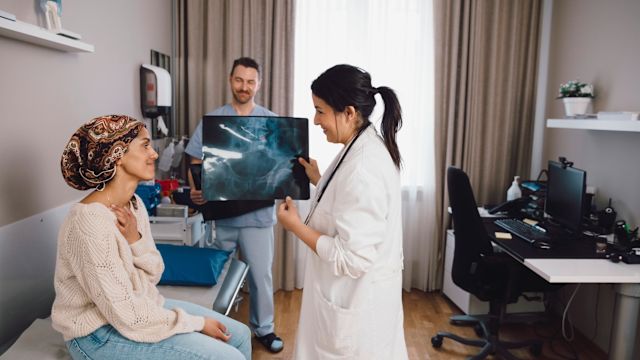Updated on September 26, 2024
A recurrence of breast cancer is breast cancer that returns after treatment and a period of time when a person appears to be cancer free. This period of time can be months or years.
Recurrences are caused by cancer cells that manage to survive the initial treatment and remain in the body to form new tumors. Recurrences can affect the same breast that was treated for cancer, nearby lymph nodes, or distant areas of the body.
If you or a loved one has been diagnosed with breast cancer, the risk of recurrence is an important topic to discuss with your healthcare team. Based on the diagnosis and the risk of recurrence, your healthcare team may recommend certain approaches to treatment. Following initial treatment, monitoring for recurrence and taking steps to reduce the risk of recurrence will be a part of follow-up care.
What is the risk of recurrence?
While cancer is often unpredictable, there are some factors that are known to increase the risk of breast cancer recurrence. Some factors that you may discuss:
- If the cancer has spread to lymph nodes
- The size of the tumor
- The stage of the cancer
- If the cancer is growing quickly and/or considered aggressive
- Hormone receptor status (if the cancer is using hormones to grow)
- Age at the time of diagnosis
Are there therapies that can prevent recurrence?
Your healthcare providers may recommend a combination of therapies to help reduce the risk of recurrence. One example is radiation therapy, which uses high doses of energy to damage and kill cancer cells. Radiation therapy may be recommended after surgery, with the goal of eliminating any cancer cells that were not removed.
Additional therapies that are given after an initial therapy are referred to as adjuvant therapies. In addition to radiation therapy, chemotherapy and targeted therapy drugs may also be used as adjuvant therapies. However, the choice of treatment depends on characteristics about the cancer, such as hormone-receptor status.
Are there lifestyle changes that can reduce the risk of recurrence?
After initial treatment for breast cancer, staying as healthy as possible can improve overall quality of life, and it may also lower the risk of recurrence. Recommendations include maintaining a healthy weight, staying physically active, getting enough sleep, and following good nutrition.
It is also recommended to avoid alcohol consumption entirely. Your healthcare team can provide specific recommendations around foods to eat, foods to avoid, and exercising safely.
How will I be monitored for recurrence?
Following treatment, a person will still need regular appointments with their healthcare team to monitor overall health, side effects from treatment, and signs that the cancer is not completely gone. Some topics to discuss:
- Keeping a personal medical record. Ask your healthcare team for documents summarizing your diagnosis and treatment.
- A recommended schedule for follow up appointments, exams, and tests. This includes exams and tests related to breast cancer, as well as other potential health concerns and side effects from treatment.
- Potential signs and symptoms of recurrence. You’ll want to know what to look for and when to contact your healthcare providers.
What can I do to manage stress?
As mentioned above, breast cancer recurrence can happen months or years after treatment, and the knowledge that a recurrence may happen can be a significant source of distress for a person who has been treated for breast cancer. Breast cancer diagnosis and treatment can also affect how a person feels about their body, which can impact mental and emotional health. People who have been diagnosed with breast cancer often benefit from strategies like counseling, spiritual support, and support groups.
In addition to these steps, it also helps to make time for things you enjoy doing and the people you enjoy spending time with.






